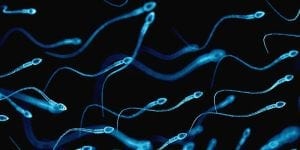Iodine plays a very big role in thyroid function. The thyroid gland requires it in order to successfully manufacture thyroxine (T4) and triiodothyronine (T3) hormones. The role of these hormones in the body is to regulate different enzymes and other organic processes that are important for life. When your body’s thyroid gland is not balanced, it results in imbalances.
A lot of research has been carried out to determine how thyroid function is related to men fertility. The Japanese Journal of Veterinary Research carried out one such study in 2004. Their aim was to determine whether its supplementation had anything to do with low sperm counts. According to their findings, it was actually found to cause low sperm count.
Iodine and Male Fertility
As a man, the thyroid hormone helps the Sertoli cells in your seminiferous tubules to make semen through the process known as spermatogenesis. Both hypo and hyperthyroidism in men lead to decreased fertility.
Hypothyroidism in men leads to low semen quality, low testicular function and low libido. Since their pituitary gland struggles to stimulate the unresponsive thyroid gland, the thyroid-stimulating hormone (TSH) levels go up. This leads to raised prolactin levels, which ultimately cause impotence. Hyperthyroidism is no better. It also causes infertility in men as the process of sperm production requires normal thyroid levels in order to function normally.
Both hyper and hypothyroidism can change spermatogenesis. In the case of hyperthyroidism, both the pituitary gland and testicular functions get altered through releasing hormones and, in turn, increase the conversion of androgens to estrogens. All this impacts male fertility to a great extent.
For men who had symptoms of hypothyroidism in their childhood, it is possible to get reproductive problems in their adulthood. One way for a male child to have hypothyroidism is through his mother during pregnancy. That is why it is very important for pregnant mothers to watch what they eat. If hypothyroidism gets prolonged before the male hits the puberty stage, it can lead to enlarged testicles due to its effects on both Leydig and Sertoli cells.
Effects of Hypothyroidism and Hyperthyroidism
Due to hyper or hypothyroidism in the body, the thyroid gland can get problems that lead to changes in metabolism, low energy levels and poor reproductive health.

However, some of its symptoms include:
• Sudden weight loss
• Goiter
• Changes in appetite
• Lack of sleep (insomnia)
• Increased sweating
• Speedy /increased heartbeat
• Infertility
Hypothyroidism symptoms in men are the same as those symptoms of low testosterone.
They include:
• Extreme fatigue
• Increased hair loss
• Rapid weight gain
• Poor metabolism
• Infertility
• Depression
• Low libido
• Muscle weakness
• Goiter
• Unusually cold limbs
• Increased risk of infections
Apart from low libido, hypothyroidism can lead to erectile dysfunction due to lowered fertility hormones in men. As for hyperthyroidism, these high thyroid levels lead to increased testosterone and gonadotropin hormones, which are causes of sperm damage.
Optimal Thyroid Values for Men
For a long time, the reference ranges used for men thyroid levels were inaccurate. These levels stood at 0.50-5.5 mlU/L instead of 0.3-3.3 mlU/L, which is the normal adults’ range. This meant that many men got diagnosed with hypothyroidism, which was not the case.
Natural Thyroid Support for Male Fertility
If you are a man trying to increase your fertility by controlling your thyroid levels, making diet changes should be your starting point. Since your thyroid gland needs to function properly, the wise thing is to avoid either hypo or hyperthyroidism. For men with hypothyroidism, eating foods that will raise their thyroid levels is the key. These foods include seafood, organic seaweed or cranberries. However, they should keep away from excess soy foods and uncooked cruciferous vegetables that contain anti-thyroid nutrients.
Formulas that consist of selenium, zinc and l-tyrosine amino acids are great in promoting healthy thyroid function.
On the other hand, hyperthyroidism is hard to address naturally. However, there are herbs that can help resolve this problem. All you need is to balance the immune system, which will, in return, normalize thyroid antibody production.




